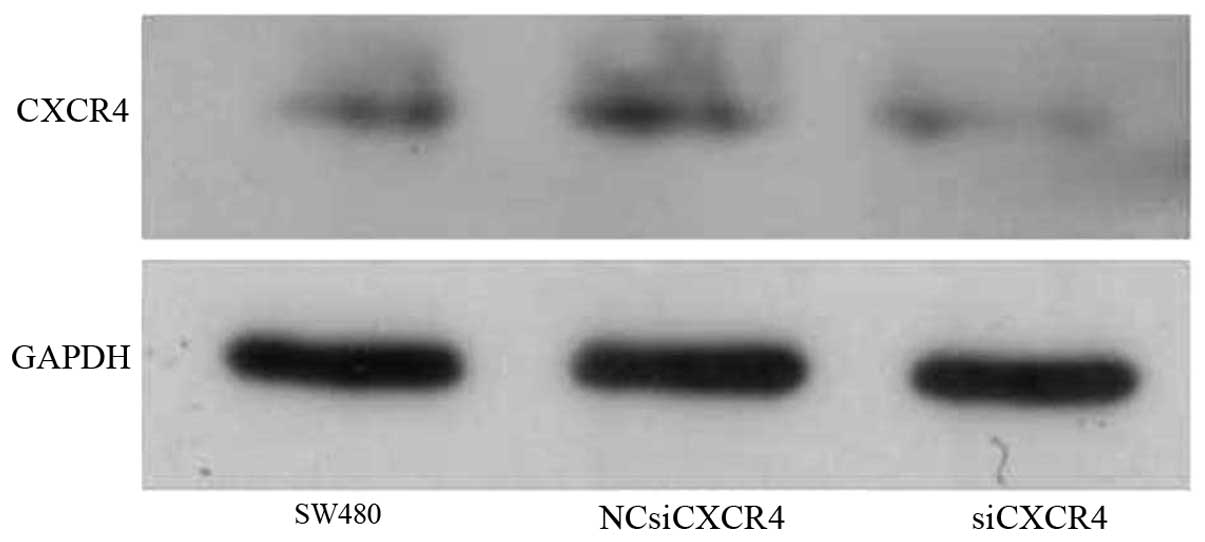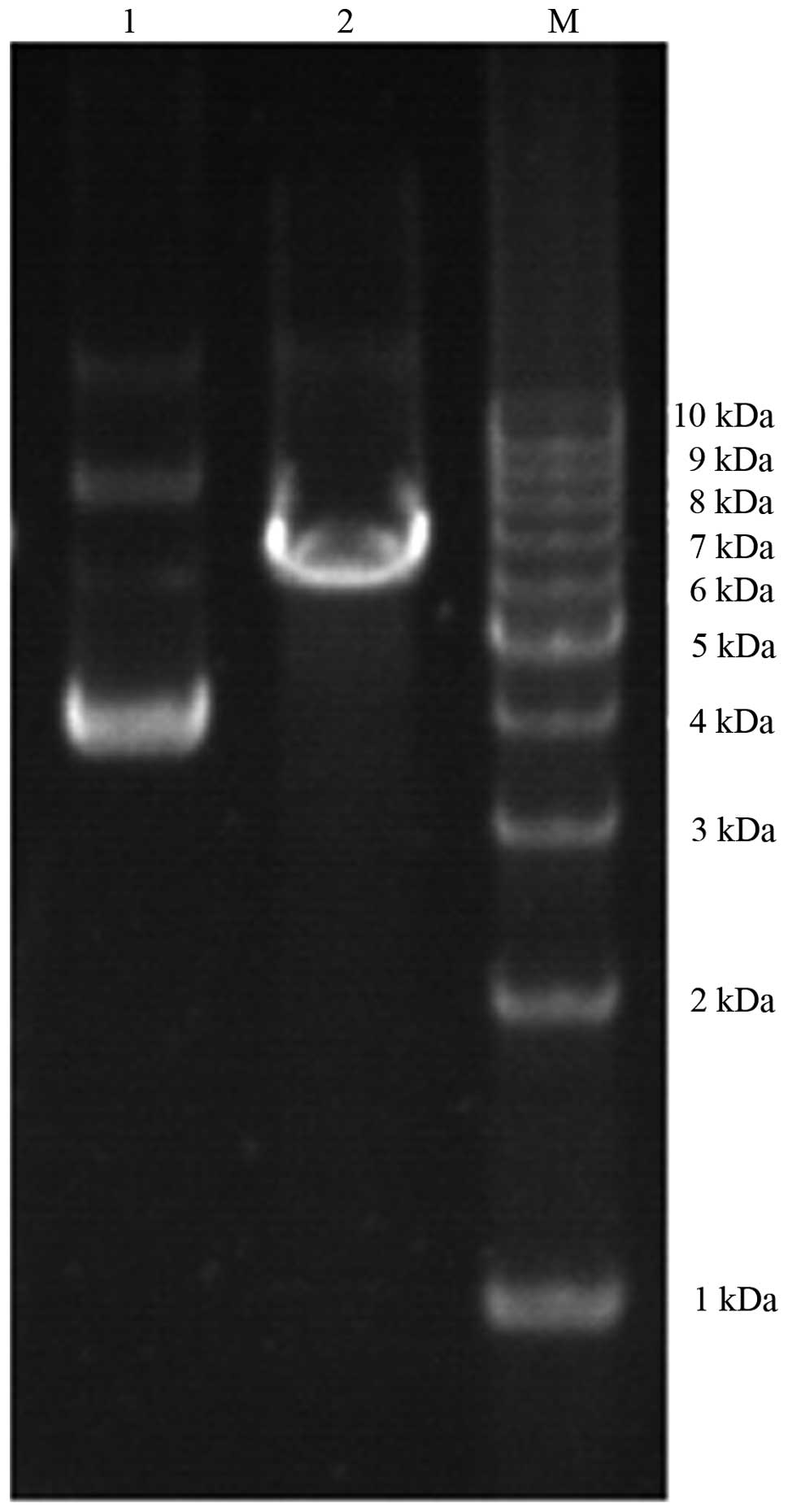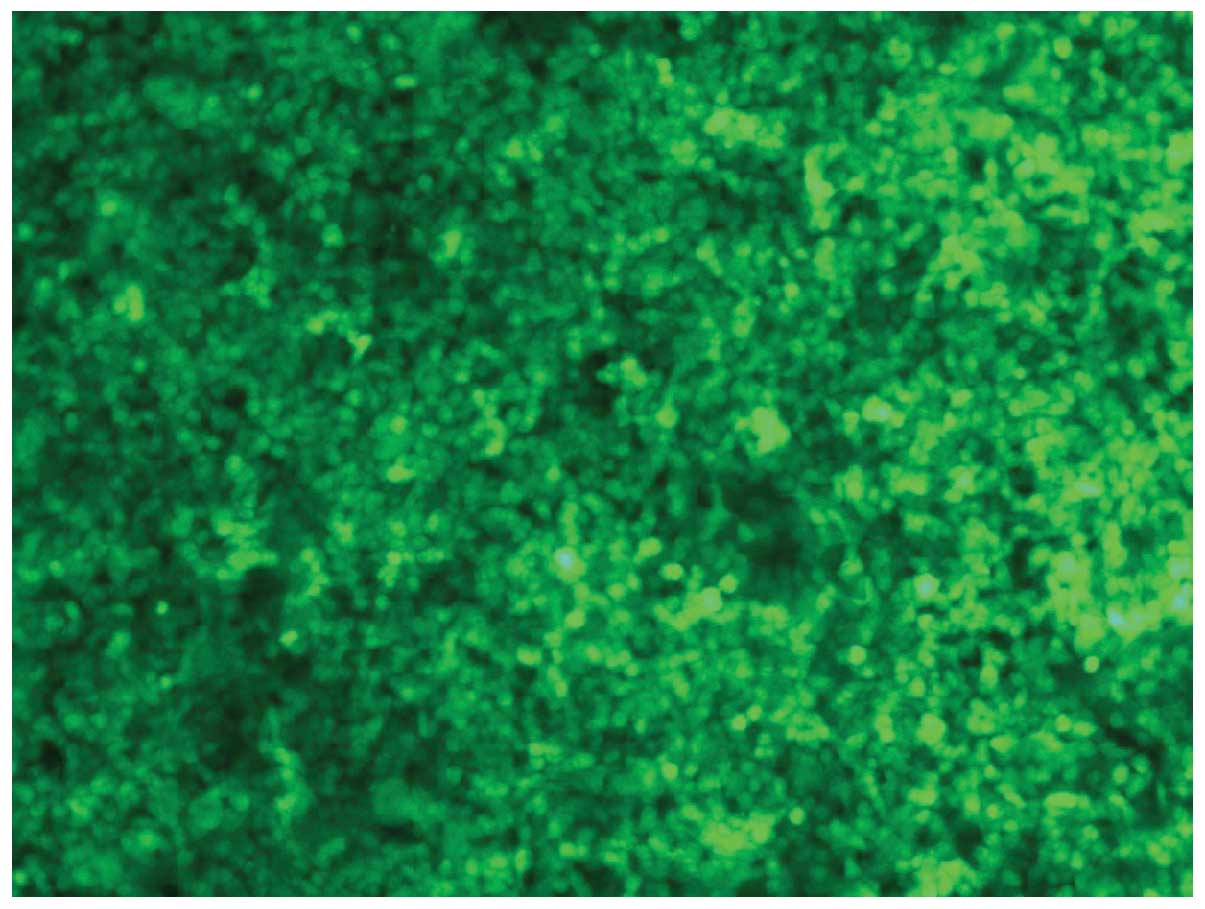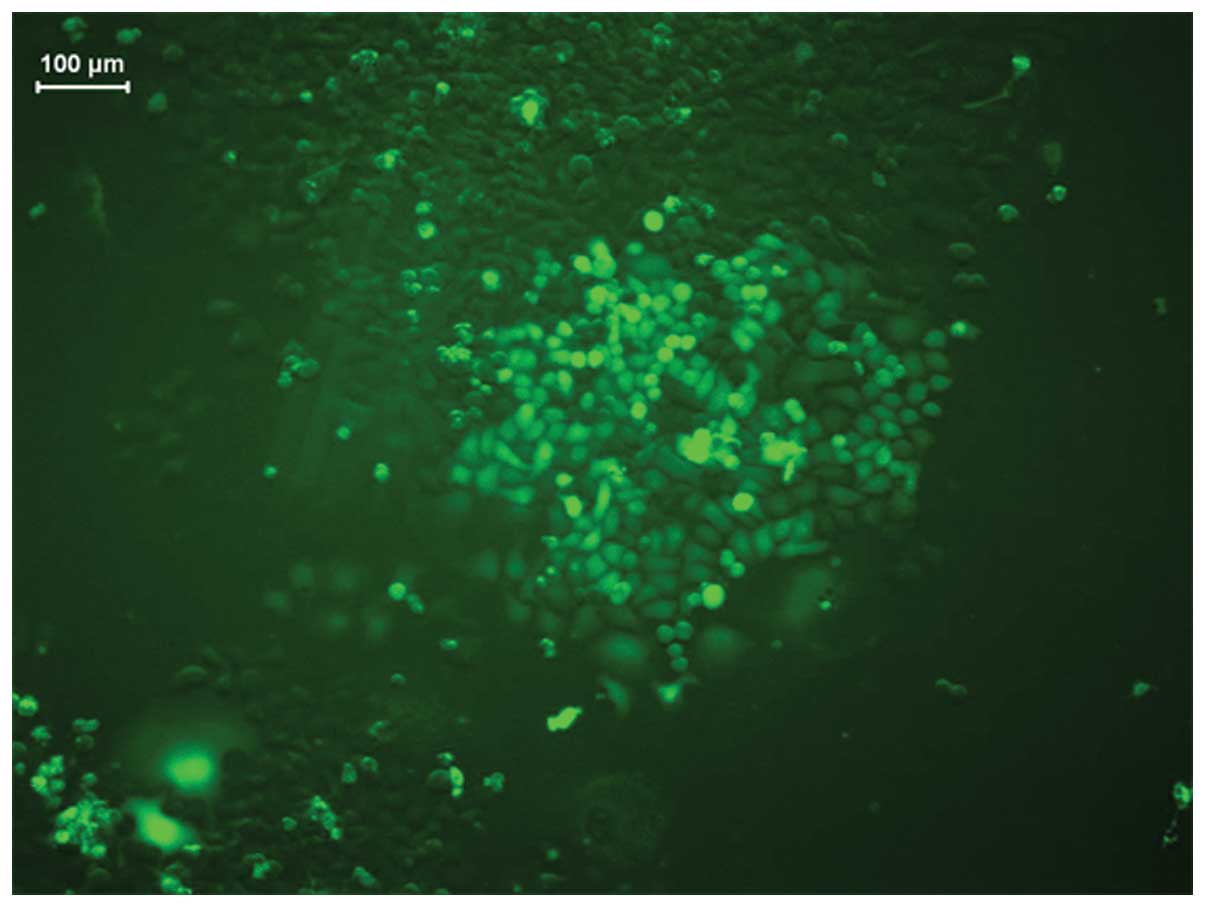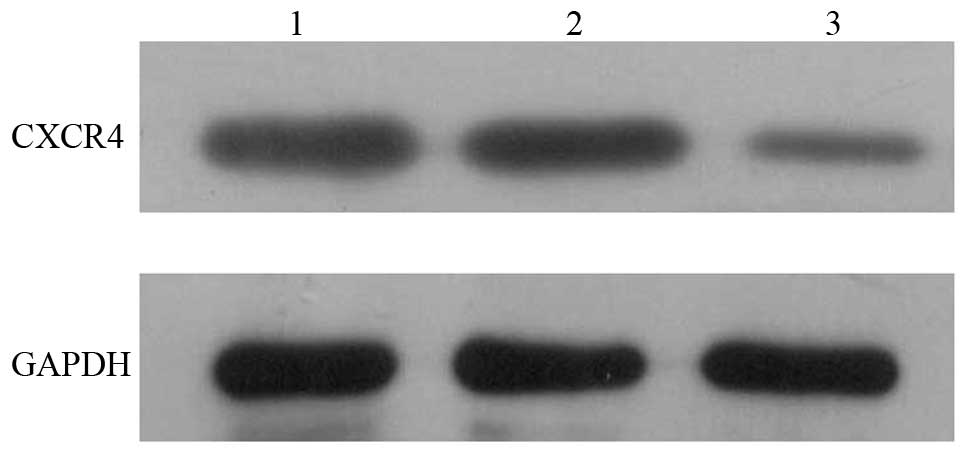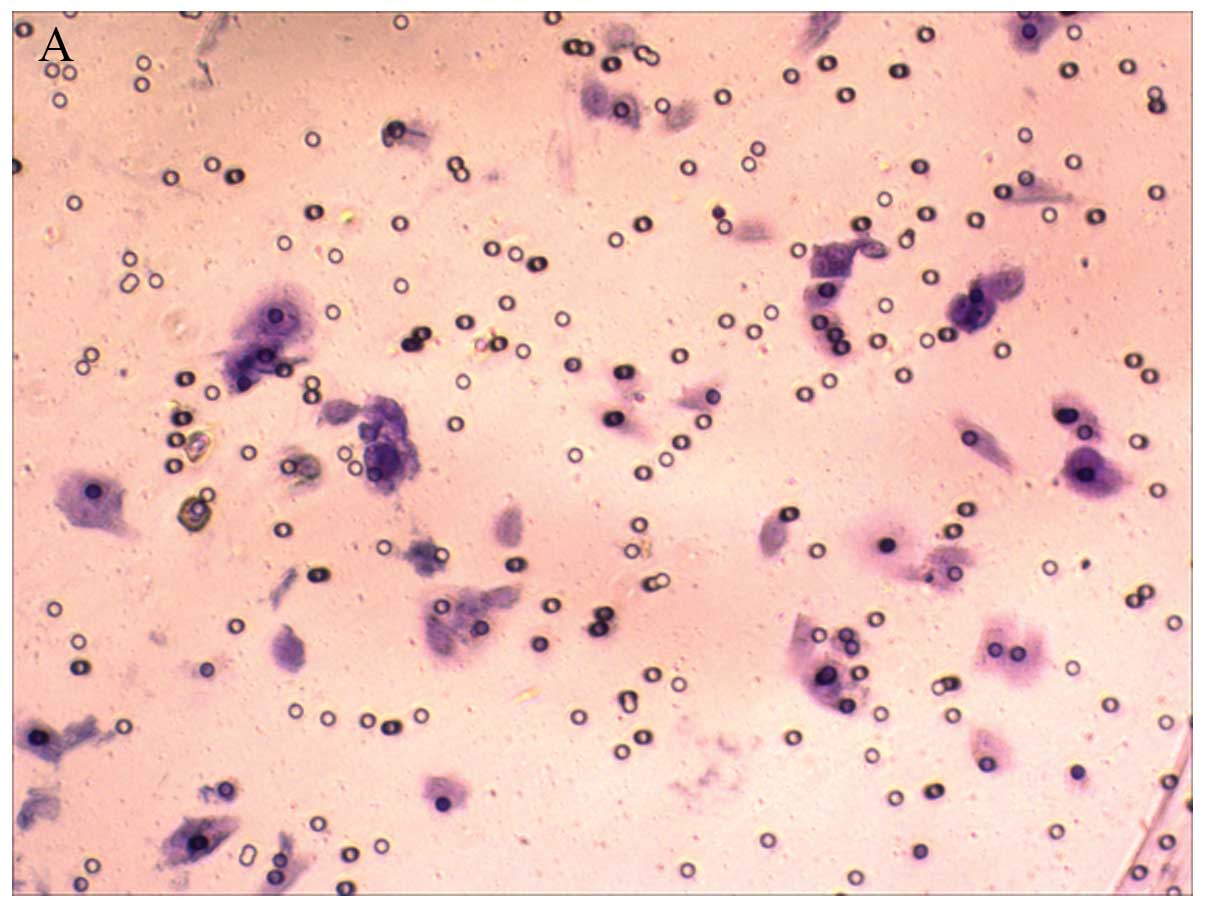|
1.
|
Wichmann MW, Beukes E, Esufali ST,
Plaumann L and Maddern G: Five-year results of surgical colorectal
cancer treatment in rural Australia. ANZ J Surg. 83:112–117.
2013.
|
|
2.
|
Shin HN, Moon HH and Ku JL: Stromal
cell-derived factor-1α and macrophage migration-inhibitory factor
induce metastatic behavior in CXCR4-expressing colon cancer cells.
Int J Mol Med. 30:1537–1543. 2012.
|
|
3.
|
Yasuoka H, Kodama R, Hirokawa M, Takamura
Y, Miyauchi A, Sanke T and Nakamura Y: CXCR4 expression in
papillary thyroid carcinoma: induction by nitric oxide and
correlation with lymph node metastasis. BMC Cancer. 8:2742008.
View Article : Google Scholar : PubMed/NCBI
|
|
4.
|
Cavallaro S: CXCR4/CXCL12 in
non-small-cell lung cancer metastasis to the brain. Int J Mol Sci.
14:1713–1727. 2013. View Article : Google Scholar : PubMed/NCBI
|
|
5.
|
Sekiya R, Kajiyama H, Sakai K, Umezu T,
Mizuno M, Shibata K, Yamamoto E, Fujiwara S, Nagasaka T and Kikkawa
F: Expression of CXCR4 indicates poor prognosis in patients with
clear cell carcinoma of the ovary. Hum Pathol. 43:904–910. 2012.
View Article : Google Scholar : PubMed/NCBI
|
|
6.
|
Jung SJ, Kim CI, Park CH, Chang HS, Kim
BH, Choi MS and Jung HR: Correlation between chemokine receptor
CXCR4 expression and prognostic factors in patients with prostate
cancer. Korean J Urol. 52:607–611. 2011. View Article : Google Scholar : PubMed/NCBI
|
|
7.
|
Wang L, Huang T, Chen W, Gao X, Zhou T, Wu
Z and Sun Y: Silencing of CXCR4 by RNA interference inhibits cell
growth and metastasis in human renal cancer cells. Oncol Rep.
28:2043–2048. 2012.PubMed/NCBI
|
|
8.
|
Gros SJ, Kurschat N, Drenckhan A, Dohrmann
T, Forberich E, Effenberger K, Reichelt U, Hoffman RM, Pantel K,
Kaifi JT and Izbicki JR: Involvement of CXCR4 chemokine receptor in
metastastic HER2-positive esophagealcancer. PLoS One. 7:e472872012.
View Article : Google Scholar : PubMed/NCBI
|
|
9.
|
Zhong W, Chen W, Zhang D, Sun J, Li Y,
Zhang J, Gao Y, Zhou W and Li S: CXCL12/CXCR4 axis plays pivotal
roles in the organ-specific metastasis of pancreatic
adenocarcinoma: a clinical study. Exp Ther Med. 4:363–369.
2012.
|
|
10.
|
Lee HJ and Jo DY: The role of the
CXCR4/CXCL12 axis and its clinical implications in gastric cancer.
Histol Histopathol. 27:1155–1161. 2012.PubMed/NCBI
|
|
11.
|
Zhang SS, Han ZP, Jing YY, Tao SF, Li TJ,
Wang H, Wang Y, Li R, Yang Y, Zhao X, Xu XD, Yu ED, Rui YC, Liu HJ,
Zhang L and Wei LX: CD133(+)CXCR4(+) colon cancer cells exhibit
metastatic potential and predict poor prognosis of patients. BMC
Med. 10:852012.
|
|
12.
|
Wang TB, Chen ZG, Wei XQ, Wei B and Dong
WG: Serum vascular endothelial growth factor-C and
lymphangiogenesis are associated with the lymph node metastasis and
prognosis of patients with colorectal cancer. ANZ J Surg.
81:894–899. 2011.PubMed/NCBI
|
|
13.
|
De Falco V, Guarino V, Avilla E,
Castellone MD, Salerno P, Salvatore G, Faviana P, Basolo F, Santoro
M and Melillo RM: Biological role and potential therapeutic
targeting of the chemokine receptor CXCR4 in undifferentiated
thyroid cancer. Cancer Res. 67:11821–11829. 2007.PubMed/NCBI
|
|
14.
|
Li JK, Yu L, Shen Y, Zhou LS, Wang YC and
Zhang JH: Inhibition of CXCR4 activity with AMD3100 decreases
invasion of human colorectal cancer cells in vitro. World J
Gastroenterol. 14:2308–2313. 2008. View Article : Google Scholar : PubMed/NCBI
|
|
15.
|
Kim JM, Lee YH, Ku CR and Lee EJ: The
cyclic pentapep-tide d-Arg3FC131, a CXCR4 antagonist, induces
apoptosis of somatotrope tumor and inhibits tumor growth in nude
mice. Endocrinology. 152:536–544. 2011. View Article : Google Scholar : PubMed/NCBI
|
|
16.
|
Murakami T, Kawada K, Iwamoto M, Akagami
M, Hida K, Nakanishi Y, Kanda K, Kawada M, Seno H, Taketo MM and
Sakai Y: The role of CXCR3 and CXCR4 in colorectal cancer
metastasis. Int J Cancer. 132:276–287. 2013. View Article : Google Scholar : PubMed/NCBI
|
|
17.
|
Heckmann D, Laufs S, Maier P, Zucknick M,
Giordano FA, Veldwijk MR, Eckstein V, Wenz F, Zeller WJ, Fruehauf S
and Allgayer H: A lentiviral CXCR4 overexpression and knockdown
model in colorectal cancer cell lines reveals plerixafor-dependent
suppression of SDF-1α-induced migration and invasion. Onkologie.
34:502–508. 2011.PubMed/NCBI
|
|
18.
|
Liang Z, Yoon Y, Votaw J, Goodman MM,
Williams L and Shim H: Silencing of CXCR4 blocks breast cancer
metastasis. Cancer Res. 65:967–971. 2005.PubMed/NCBI
|
|
19.
|
Smith MC, Luker KE, Garbow JR, Prior JL,
Jackson E, Piwnica-Worms D and Luker GD: CXCR4 regulates growth of
both primary and metastatic breast cancer. Cancer Res.
64:8604–8612. 2004. View Article : Google Scholar : PubMed/NCBI
|
|
20.
|
Liang Z, Wu H, Reddy S, Zhu A, Wang S,
Blevins D, Yoon Y, Zhang Y and Shim H: Blockade of invasion and
metastasis of breast cancer cells via targeting CXCR4 with an
artificial microRNA. Biochem Biophys Res Commun. 363:542–546. 2007.
View Article : Google Scholar : PubMed/NCBI
|
|
21.
|
Beverly AT and Simon PF: CXCL12
(SDF-1)/CXCR4 pathway in cancer. Clin Cancer Res. 16:2927–2931.
2010. View Article : Google Scholar : PubMed/NCBI
|
|
22.
|
Meads MB, Hazlehurst LA and Dalton WS: The
bone marrow microenvironment as a tumor sanctuary and contributor
to drug resistance. Clin Cancer Res. 14:2519–2526. 2008. View Article : Google Scholar : PubMed/NCBI
|
|
23.
|
Balkwill F: Cancer and the chemokine
network. Nat Rev Cancer. 4:540–550. 2004. View Article : Google Scholar
|
|
24.
|
Petit I, Jin D and Rafii S: The
SDF-1-CXCR4 signaling pathway: a molecular hub modulating
neo-angiogenesis. Trends Immunol. 28:299–307. 2007. View Article : Google Scholar : PubMed/NCBI
|
|
25.
|
Rubie C, Frick VO, Ghadjar P, Wagner M,
Justinger C, Faust SK, Vicinus B, Gräber S, Kollmar O and Schilling
MK: CXC receptor-4 mRNA silencing abrogates CXCL12-induced
migration of colorectal cancer cells. J Transl Med. 9:222011.
View Article : Google Scholar : PubMed/NCBI
|
|
26.
|
Wang SC, Lin JK, Wang HS, Yang SH, Li AF
and Chang SC: Nuclear expression of CXCR4 is associated with
advanced colorectal cancer. Int J Colorectal Dis. 25:1185–1191.
2010. View Article : Google Scholar : PubMed/NCBI
|
|
27.
|
Fukunaga S, Maeda K, Noda E, Inoue T, Wada
K and Hirakawa K: Association between expression of vascular
endothelial growth factor C, chemokine receptor CXCR4 and lymph
node metastasis in colorectal cancer. Oncology. 71:204–211. 2006.
View Article : Google Scholar : PubMed/NCBI
|
|
28.
|
Matsusue R, Kubo H, Hisamori S, Okoshi K,
Takagi H, Hida K, Nakano K, Itami A, Kawada K, Nagayama S and Sakai
Y: Hepatic stellate cells promote liver metastasis of colon cancer
cells by the action of SDF-1/CXCR4 axis. Ann Surg Oncol.
16:2645–2653. 2009. View Article : Google Scholar : PubMed/NCBI
|
|
29.
|
Mongan JP, Fadul CE, Cole BF, Zaki BI,
Suriawinata AA, Ripple GH, Tosteson TD and Pipas JM: Brain
metastases from colorectal cancer: risk factors, incidence, and the
possible role of chemokines. Clin Colorectal Cancer. 8:100–105.
2009. View Article : Google Scholar
|
|
30.
|
Speetjens FM, Liefers GJ, Korbee CJ,
Mesker WE, van de Velde CJ, van Vlierberghe RL, Morreau H,
Tollenaar RA and Kuppen PJ: Nuclear localization of CXCR4
determines prognosis for colorectal cancer patients. Cancer
Microenviron. 2:1–7. 2009. View Article : Google Scholar : PubMed/NCBI
|
|
31.
|
Brand S, Dambacher J, Beigel F, Olszak T,
Diebold J, Otte JM, Göke B and Eichhorst ST: CXCR4 and CXCL12 are
inversely expressed in colorectal cancer cells and modulate cancer
cell migration, invasion and MMP-9 activation. Exp Cell Res.
310:117–130. 2005. View Article : Google Scholar : PubMed/NCBI
|
|
32.
|
Ottaiano A, Franco R, Aiello Talamanca A,
Liguori G, Tatangelo F, Delrio P, Nasti G, Barletta E, Facchini G,
Daniele B, Di Blasi A, Napolitano M, Ieranò C, Calemma R, Leonardi
E, Albino V, De Angelis V, Falanga M, Boccia V, Capuozzo M, Parisi
V, Botti G, Castello G, Vincenzo Iaffaioli R and Scala S:
Overexpression of both CXC chemokine receptor 4 and vascular
endothelial growth factor proteins predicts early distant relapse
in stage II-III colorectal cancer patients. Clin Cancer Res.
12:2795–2803. 2006. View Article : Google Scholar
|
|
33.
|
Zhu Y, Yang P, Zhang X, Zhang L, Cui G,
Wang Q, Lv L, Zhang Y, Xin X, Yan T, Zhao M and Zhang N: The effect
and mechanism of CXCR4 silencing on metastasis suppression of human
glioma u87 cell line. Anat Rec (Hoboken). 296:1857–1864. 2013.
View Article : Google Scholar : PubMed/NCBI
|
|
34.
|
Shen B, Zheng MQ, Lu JW, Jiang Q, Wang TH
and Huang XE: CXCL12-CXCR4 promotes proliferation and invasion of
pancreatic cancer cells. Asian Pac J Cancer Prev. 14:5403–5408.
2013. View Article : Google Scholar : PubMed/NCBI
|
|
35.
|
Sun X, Charbonneau C, Wei L, Yang W, Chen
Q and Terek RM: CXCR4-targeted therapy inhibits VEGF expression and
chondrosarcoma angiogenesis and metastasis. Mol Cancer Ther.
12:1163–1170. 2013. View Article : Google Scholar : PubMed/NCBI
|
|
36.
|
Wang B, Wang W, Niu W, Liu E, Liu X, Wang
J, Peng C, Liu S, Xu L, Wang L and Niu J: SDF-1/CXCR4 axis promotes
directional migration of colorectal cancer cells through
upregulation of integrin αvβ6. Carcinogenesis. 35:282–291.
2014.PubMed/NCBI
|
|
37.
|
Xue B, Wu W, Huang K, Xie T, Xu X, Zhang
H, Qi C, Ge J and Yu Y: Stromal cell-derived factor-1 (SDF-1)
enhances cells invasion by αvβ6 integrin-mediated signaling in
ovarian cancer. Mol Cell Biochem. 380:177–184. 2013.
|
|
38.
|
Kiss DL, Windus LC and Avery VM: Chemokine
receptor expression on integrin-mediated stellate projections of
prostate cancer cells in 3D culture. Cytokine. 64:122–130. 2013.
View Article : Google Scholar : PubMed/NCBI
|
|
39.
|
Paddison PJ, Caudy AA, Bernstein E, Hannon
GJ and Conklin DS: Short hairpin RNAs (shRNAs) induce
sequence-specific silencing in mammalian cells. Genes Dev.
16:948–958. 2002. View Article : Google Scholar : PubMed/NCBI
|
|
40.
|
De Maria R, Miretti S, Iussich S, Olivero
M, Morello E, Bertotti A, Christensen JG, Biolatti B, Levine RA,
Buracco P and Di Renzo MF: Met oncogene activation qualifies
spontaneous canine steosarcoma as a suitable pre-clinical model of
human steosarcoma. J Pathol. 218:399–408. 2009.PubMed/NCBI
|
|
41.
|
Chen D, Huang H, Pan C, Wang J, Zhang B
and Wang A: Antitumor effects of targeting hTERT
lentivirus-mediated RNA interference against KB cell lines. Oncol
Res. 17:621–630. 2009. View Article : Google Scholar : PubMed/NCBI
|
|
42.
|
Chunkang C, Rui Y, Feng X, Juan G, Xi Z,
Lingyun W, Xiao L and Jianmin W: The roles of SDF-1/CXCR4 axis and
its relationship with apoptosis in the myelodysplastic syndromes.
Med Oncol. 28(Suppl 1): 494–500. 2011. View Article : Google Scholar : PubMed/NCBI
|
|
43.
|
Yu T, Wu Y, Huang Y, Yan C, Liu Y, Wang Z,
Wang X, Wen Y, Wang C and Li L: RNAi targeting CXCR4 inhibits tumor
growth through inducing cell cycle arrest and apoptosis. Mol Ther.
20:398–407. 2012. View Article : Google Scholar : PubMed/NCBI
|
|
44.
|
Wang Q, Diao X, Sun J and Chen Z:
Regulation of VEGF, MMP-9 and metastasis by CXCR4 in a prostate
cancer cell line. Cell Biol Int. 35:897–904. 2011. View Article : Google Scholar : PubMed/NCBI
|















